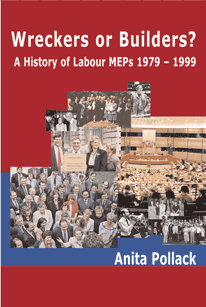
Anita Pollack

"Wreckers or Builders?"
Review by Jennifer Rankin
Rankin, Jennifer (2009) 'Labour MEPs' petty rows and punch-ups' European Voice. 3 October 2009
Anita Pollack had plenty of contact with her fellow Labour MEPs, but there is more diary than drama in her account.
Were they wreckers or builders? This is the question that Anita Pollack asks about the 83 UK Labour members of the European Parliament between 1979 and 1999, from the first direct elections to the Parliament to the mass resignation of the European Commission. For 18 of the 20 years, it was also a time with a Conservative government in the UK, with Margaret Thatcher setting the agenda even after she was forced out as prime minister in 1990.
Pollack was there. First as an assistant to Barbara Castle, the fiery trade unionist and former health minister, then as an MEP herself in 1989-99. This is an insider's account –and that is the book's strength and weakness.
Pollack avoids the trap of being relentlessly on-message about her party. The British Labour MEPs were a pugnacious group. They fought the Conservatives, they fought the Commission. But most of the time they fought each other –sometimes literally. The petty rows and punch-ups are all part of the story. Divisions were not surprising: in the 1980s, the Labour party was in a state of civil war between moderates and its radical ‘militant' left wing. But even the MEPs elected in 1994 were “bedevilled by factionalism...split almost neatly in half with 32 at times close to loathing the other 30”, writes Pollack. “It was no longer about being pro-or anti-EEC, but often about personalities.”
The first elected Labour MEPs were reluctant Europeans at best. Many were opposed to the European Community and expected to be one-term members, confidently believing that a Labour victory in the 1983 general election would be followed by a swift exit from the EEC. But Labour went down to its worst-ever defeat.
It was not just Euroscepticism that made many MEPs aloof. They found the European Parliament “a strange institution”, with a very different political culture from the cut-and-thrust of Westminster. Solidarity with other socialists was scarce, with many of the early members sticking together in an Anglophone club. Some members thought a “pro-European attitude might be catching”, Pollack writes, recalling how Labour MEPs snubbed other socialists, causing offence that rankled years later.
Hot and cold
Things began to change in 1989. Labour bigwigs in Westminster warmed to Europe, as Thatcher became increasingly hostile to it, thus automatically making the European project a good thing. But local parties still found the EU “eye-glazing”. MEPs who made the trip to address their local parties were given the speaking slot before the meeting decamped to the pub, recalls Pollack mournfully. Tony Blair, elected Labour party leader in 1994, promised to put Britain “at the heart mournfully. Tony Blair, elected Labour party leader in 1994, promised to put Britain “at the heart of Europe”, but this did not extend to taking Labour MEPs to his heart. When 32 old-school Labour MEPs took out a newspaper advertisement attacking Blair's goal to drop state ownership from the party constitution, they met cold fury. Blair went to Brussels and told his MEPs “to grow up” –a memory that still pains Pollack and her colleagues who did not sign the letter. “We were all tarred with that brush and we never won back the respect,” recalls one MEP. This anecdote and others shed light on Labour and the UK's engagement with Europe.
The problem with this book is that the story is buried under an avalanche of details. At times the book reads as if Pollack simply opened her appointment diary from 1979 and 1989 and copied it out. The reader learns about the party conference meetings MEPs spoke at, attendances and absences at group meetings and the frustrations of only getting BBC domestic radio broadcasts on long-wave frequency. There are also scores to be settled. (For instance, John Kerr, the head of the UK's representation to the EU, is called “Sir Jock-have-a-cocktail-party-Kerr”, a sign of Labour MEPs' bitterness at perceived slights from British civil servants during the Tory years.) Add in countless friendly mentions of favourite journalists and staff and this is an over-long book.
Ultimately, Pollack is so immersed in detail that she never answers her question – were they wreckers or builders? –though perhaps she intends to do so in the next volume, covering 1999 to the present. The idea of writing a history of a political delegation within the Parliament is an interesting one –another sign, perhaps, that the elected Parliament might be reaching respectable middle age –but Pollack writes as if her readership is guaranteed. For any author, that is a dangerous presumption. This book will no doubt be given a place on the shelves at party headquarters and in some MEPs' offices. But it is hard to avoid the conclusion that more ruthless editing might have made this a more satisfying read for those –both Brits and non-Brits -who are interested in how the Parliament works.
© 2009 European Voice. All rights reserved.